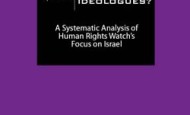Experts or Ideologues? Sarah Leah Whitson
The references for this article are available here.
Sarah Leah Whitson, Director of the Middle East and North Africa Division
Prior to joining HRW, Whitson was a board member of the New York chapter of the Arab-American Anti-Discrimination Committee (ADC). She, together with the New York chapter and the national organization, were very active in pro-Palestinian, anti-Israel political causes (ADC Times 2002). 14 These include participation in demonstrations, and a high-profile meeting with then UN Secretary Kofi Annan to promote Palestine issues (ADC Press Release Apr. 29, 2002). Less than one month after the Park Hotel “Passover Massacre” in which Palestinian terrorists murdered 30 Israeli civilians and injured another 140, the President of the ADC at the time, Ziad Asali asserted in the ADC Press Release April 19, 2002 that,
The President [Bush] has not acknowledged the human tragedy that has been inflicted on Jenin, Nablus and other Palestinian towns, and seems prepared to tolerate any level of brutality Israel cares to inflict on the Palestinian people.
Whitson was also involved with other anti-Israel NGOs in the past: MADRE and the Center for Social and Economic Rights (CESR). MADRE’s “Palestine” webpage employs rhetoric such as “apartheid,” “cantons,” and “matrix of control,” and describes terrorism (“armed attacks”) as a Palestinian “strategy” to achieve “self determination.”15 CESR accuses Israel of “brutality,” “siege” and “depopulation” against Palestinians and initiated a lobbying effort to pressure the U.S. government to change its policies on Israel (CESR also employed Lucy Mair – see below).16 The hiring by HRW of a known pro-Palestinian activist to serve as the director of its Middle East division fatally compromises any possibility of neutral, objective attention to real and universal human rights issues in the region.
At HRW, Whitson continues to promote her anti-Israel political agenda, particularly through support of the Boycott, Divestment and Sanctions (BDS) movement. In 2004, immediately after HRW’s tendentious Razing Rafah report, she joined the “Caterpillar” boycott campaign, writing that the firm’s bulldozers “are being used to illegally destroy Palestinian homes…” and “continued sales will make the company complicit in human rights abuses.” On December 27, 2005 Whitson attacked Israeli policy in a public letter (HRW letter 2005) addressed to President Bush condemning “Expanding Settlements in the Occupied Palestinian Territories,” which invoked a highly distorted and politicized version of international law. Whitson concluded her letter by restating the overriding political objective of HRW’s leadership: sanctions against Israel, including cutting American aid. And in an article she published in Al-Akhbar (Lebanon) in 2007, Whitson referred to Hezbollah as the “Islamic Resistance” and portrayed Israel as the aggressor.
In May 2009, Whitson led a trip to seek support in Saudi Arabia, where she emphasized HRW’s “shortage of funds because of the global financial crisis and the work on Israel and Gaza, which depleted HRW’s budget for the region.” She highlighted HRW’s stance of standing up to “pro-Israel pressure groups,” which, she declared, “strongly resisted the report and tried to discredit it.” The irony of using HRW’s highly biased position on Israel to elicit support from those closest to the repressive Saudi regime did not go unnoticed (Bernstein June 16, 2009).
Whitson has reacted strongly and publicly to criticism of HRW and her division’s approach. Her 2007 op-ed published in Al Akhbar dismissed NGO Monitor’s comprehensive documentation of HRW biases as equivalent to Hezbollah sympathizers’ “name-calling and invented stories” (Whitson 2007). And in a 2005 response to Professor Gerald Steinberg of NGO Monitor in the Wall Street Journal Europe, Whitson accused him of hiding Israeli government connections in an effort to discredit him personally, rather than engage the issues and debate the detailed evidence (Whitson 2005).

